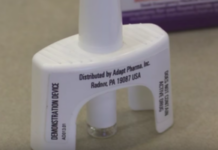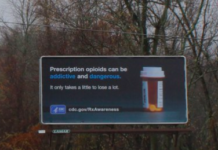Polypharmacy is Compounding the Opioid Epidemic
From The Lown Institute: The recent deaths of several beloved musicians, actors, and other public figures have brought to light the dangers of taking multiple, potentially fatal drugs.
"In...
The Secretive Family Making Billions From the Opioid Crisis
In this piece for Esquire, Christopher Glazek profiles the Sacklers, the family that owns the pharmaceutical company that manufactures OxyContin. He investigates how the Sacklers' marketing...
There’s Little Evidence Abuse-Deterrent Opioids Work
From STAT: In recent years, the pharmaceutical industry has proposed using abuse-deterrent opioids - those that make it more difficult to crush, snort, or inject...
Stop Chasing the Drug, Focus on ACEs
From ACEs Connection: According to Dr. Daniel Sumrok, director of the Center for Addiction Sciences at the University of Tennessee, addiction is a normal response to...
Experts Warn of an Emerging ‘Stimulant Epidemic’
From Medscape: While policymakers and members of the general public are justifiably focused on addressing the opioid epidemic, there is another epidemic that may be...
Powerful Opioid Suspected in 10-year-old Miami Boy’s Death
From STAT: A 10-year-old boy from Miami recently died from a fentanyl overdose, becoming one of the youngest victims of the opioid crisis.
Article →
My Grandmother is a Drug Addict—and I Blame Big Pharma
In this piece for Alternet, Joshua Wilkey discusses his grandmother's addiction to opioid painkillers and details the role that pharmaceutical companies have played in Appalachia's opioid...
Should Our Tax Dollars Be Spent on Promoting Drugs?
As part of the Affordable Care Act, the federal government has made a commitment to integrate behavioral health with physical medicine. Physicians have saddled America with addiction to antidepressants, antipsychotics, and benzodiazpines. If the federal government decides that opiate addiction is ok, as they seem to have conceded, shouldn’t the question be “what is the cheapest and the safest opiate?” In Europe, heroin is an option right along with buprenorphine and methadone. It seems to me that the “back-door” legalization of opiates under the guise of “treatment” ought to at least be debated out in the open.
British Medical Association Takes On Prescription Drug Dependence
Last year the British Medical Association (BMA) released a report on dependence and withdrawal from prescription drugs including benzodiazepines, z-drugs, opioids, and antidepressants. Now,...
Benzodiazepine Prescriptions in Older Adults Used in Rural and Low Income Areas
Benzodiazepine prescription practices may be in response to an epidemic of distress, rather than being used to treat specific mental health diagnoses.
NEJM Special Report on Addressing the Opioid Crisis
From National Institutes of Health: NIH Director Dr. Francis Collins and NIDA Director Dr. Nora Volkow have co-authored a special report on a new public-private...
The More Opioids Doctors Prescribe, the More Money They Make
An exclusive analysis by CNN and researchers at Harvard University found that opioid manufacturers are paying physicians huge sums of money — and that doctors with higher...
“As Opioid Deaths Reach Record High, Drug Industry Resists Efforts to Rein in Prescriptions”
“In 2014, the number of people who died from drug overdoses in the United States reached 47,055 — an all-time high, according to a disturbing report published Friday by the Centers for Disease Control and Prevention (CDC),” but “the effort to get physicians to curb their prescribing of these drugs may be faltering amid stiff resistance from drugmakers, industry-funded groups and, now, even other public health officials.”
The Link Between Opioids and Unemployment
From The Atlantic: A recent study found that increases in unemployment rates are associated with increased opioid overdoses and emergency room visits.
Article →
Companies That Fueled the Opioid Epidemic Should Fund Efforts to End It
The quickest way to restore safe use of opioid prescription is to insist that the drug companies that promoted the overuse of opioids now create a pot of money to develop powerful TV, radio, and print ads, free continuing education offerings, and drug rehabilitation research.
TV Documentary Funded by Doctor with Industry Ties
From STAT: A new documentary, "The Painful Truth," chronicles the plight of several patients struggling to find treatment for their chronic pain, suggesting that physicians...
Opioid Use in Pregnancy Dangerous and Understudied
Nora Volkow, the director of the National Institute on Drug Abuse (NIDA), authored an editorial for BMJ this month warning that the opioid abuse epidemic could have dangerous consequences for pregnant women. While the effects of opioid exposure on the developing brain are yet unknown, research suggests that infants may suffer from withdrawal syndrome, nervous system defects, and impaired attachment with the mother.
Seattle-caught Salmon Found to Contain Drugs
From My Science Academy: In a recent study, up to 81 drugs and personal care products were detected in the flesh of salmon caught in Puget...
Big Pharma Puts the Squeeze on Cities Battling Opiate Crisis
From RevHub: The city of Baltimore is facing an unprecedented opioid overdose epidemic. Due to skyrocketing drug prices, the city is running out of funds...
“California Doctor Convicted of Murder in Overdose Deaths”
“A Los Angeles-area doctor was convicted of murder in a landmark case for killing three patients who overdosed on what a prosecutor called 'crazy,...
An Overlooked Factor in the Opioid Crisis
From It's Not Just an Opioid Crisis: The media are saturated with coverage of the familial and community devastation that has resulted from the opioid...
“Drug Overdoses Propel Rise in Mortality Rates of Young Whites”
“The rising death rates for those young white adults, ages 25 to 34, make them the first generation since the Vietnam War years of the mid-1960s to experience higher death rates in early adulthood than the generation that preceded it,” the ‘Times reports.
“Most Who OD on Opioids are Able to Get New Prescriptions”
Felice J. Freyer for the Boston Globe reports on a new study of chronic pain treatment. “More than 90 percent of people who survived...
“FDA Forced to Release Adverse Event Reports on Psychiatric Drugs”
Following a lawsuit brought by Andrew Thibault of Parents Against Pharmaceutical Abuse (PAPA), the FDA has produced adverse event and severe adverse event reports...
Why Isn’t Big Pharma Paying for the Harm it Caused?
From Alternet: The pharmaceutical industry has played a major role in causing the opioid crisis by downplaying the potentially addictive and fatal effects of narcotic pain...


























